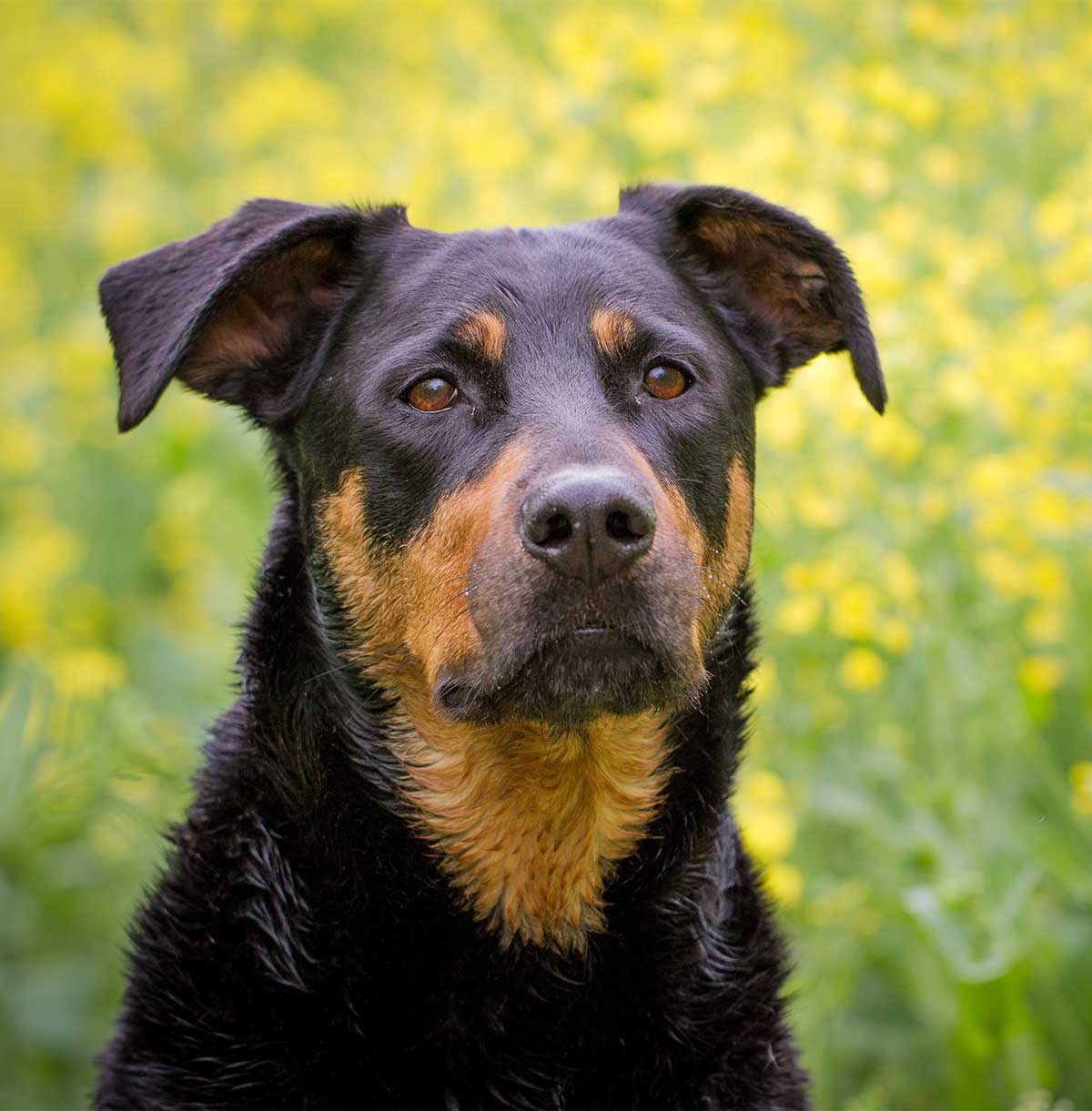When it comes to choosing the perfect puppy companion, Rottweiler Lab puppies have become increasingly popular due to their friendly nature, intelligence, and loyalty. These mixed-breed dogs, also known as Rottweiler Labrador hybrids, offer the best of both worlds by combining the protective instincts of a Rottweiler with the playful energy of a Labrador Retriever. If you're considering adding one of these adorable pups to your family, this comprehensive guide will provide all the information you need to make an informed decision.
Rottweiler Lab puppies are a fantastic choice for families, active individuals, or those looking for a versatile companion. Their balanced temperament and trainability make them ideal for various roles, including family pets, service dogs, or working animals. However, owning such a hybrid requires careful consideration of their needs, health, and lifestyle requirements.
In this article, we’ll delve into everything you need to know about Rottweiler Lab puppies, from their origin and characteristics to their care and training needs. Whether you're a seasoned dog owner or a first-timer, this guide will equip you with the knowledge to ensure a happy and healthy relationship with your new furry friend.
Read also:Ashley Leggat Relationships Unveiling The Personal Life Of A Rising Star
Table of Contents
- The Origin of Rottweiler Lab Puppies
- Characteristics of Rottweiler Lab Puppies
- Appearance and Physical Traits
- Temperament and Behavior
- Health Considerations
- Training and Socialization
- Daily Care and Grooming
- Diet and Nutrition
- Exercise and Activity Needs
- Adopting a Rottweiler Lab Puppy
The Origin of Rottweiler Lab Puppies
Rottweiler Lab puppies are a result of crossbreeding between two highly popular dog breeds: the Rottweiler and the Labrador Retriever. This hybrid, often referred to as a "Rottpador" or "Rottweiler Lab mix," was first developed in the late 20th century as part of the designer dog trend. Breeders aimed to combine the intelligence and loyalty of Labradors with the protective instincts and strength of Rottweilers, creating a versatile and adaptable companion.
History of Parent Breeds
The Rottweiler, originating from Germany, is a breed with a long history as a herding and working dog. Known for their strength and protective nature, Rottweilers have been used for various tasks, including guarding livestock and pulling carts. On the other hand, the Labrador Retriever, hailing from Canada, was originally bred for retrieving game and assisting fishermen. Labs are renowned for their friendly demeanor and high energy levels.
By combining these two breeds, Rottweiler Lab puppies inherit a mix of traits that make them excellent family pets and working dogs. Their versatility allows them to excel in various roles, from therapy dogs to search-and-rescue animals.
Characteristics of Rottweiler Lab Puppies
Rottweiler Lab puppies are known for their unique blend of characteristics that set them apart from purebred dogs. These hybrids often exhibit a combination of traits from both parent breeds, resulting in a dog that is intelligent, loyal, and adaptable.
Read also:Benjamin Ayres Age Unveiling The Life And Legacy Of A Remarkable Figure
Key Characteristics
- Intelligence: Rottweiler Lab puppies are highly intelligent, making them quick learners during training sessions.
- Loyalty: They form strong bonds with their families and are known for their protective instincts.
- Versatility: These dogs can adapt to various environments and roles, whether as a family pet or a working animal.
- Energy Levels: Rottweiler Lab puppies have moderate to high energy levels, requiring regular exercise and mental stimulation.
Understanding these characteristics is essential for potential owners to ensure they can meet the needs of their Rottweiler Lab puppy.
Appearance and Physical Traits
The appearance of Rottweiler Lab puppies can vary significantly due to the genetic mix of both parent breeds. However, there are some common physical traits that many of these hybrids share.
Physical Traits
- Size: Rottweiler Lab puppies typically grow to be medium to large-sized dogs, with males weighing between 65-100 pounds and females weighing between 55-90 pounds.
- Coat: Their coat can range from short and sleek to medium-length and dense, depending on the genetic influence of each parent breed.
- Color: Common coat colors include black, brown, and tan, with variations such as brindle or sable patterns.
Regular grooming is essential to maintain the health and appearance of their coat, especially if they inherit the thicker fur of a Labrador Retriever.
Temperament and Behavior
The temperament of Rottweiler Lab puppies is a harmonious blend of the traits from both parent breeds. While they inherit the protective instincts of Rottweilers, they also possess the friendly and playful nature of Labradors.
Behavioral Traits
- Protective: Rottweiler Lab puppies are naturally protective of their families, making them excellent watchdogs.
- Social: They enjoy interacting with people and other animals, making them suitable for families with children and other pets.
- Trainable: Their intelligence and eagerness to please make them highly trainable, responding well to positive reinforcement techniques.
Early socialization and training are crucial to ensure that their protective instincts do not develop into aggression.
Health Considerations
Like all mixed-breed dogs, Rottweiler Lab puppies can inherit health issues from either parent breed. However, they often benefit from hybrid vigor, which can reduce the likelihood of certain genetic conditions.
Potential Health Issues
- Hip Dysplasia: A common condition in both Rottweilers and Labradors, characterized by abnormal development of the hip joint.
- Elbow Dysplasia: Another joint-related issue that can affect these hybrids.
- Osteochondritis Dissecans (OCD): A condition affecting the cartilage in the joints, often seen in large breed dogs.
Regular veterinary check-ups and a balanced diet can help mitigate the risk of these health issues. Additionally, responsible breeding practices can reduce the incidence of genetic conditions.
Training and Socialization
Training and socialization are vital components of raising a well-behaved Rottweiler Lab puppy. Their intelligence and eagerness to please make them highly trainable, but consistency and patience are key to success.
Training Tips
- Positive Reinforcement: Use rewards and praise to encourage desired behaviors, avoiding harsh punishment.
- Early Socialization: Expose your puppy to various environments, people, and animals from a young age to ensure they grow into well-adjusted adults.
- Basic Commands: Teach essential commands such as "sit," "stay," and "come" to establish basic obedience.
Enrolling in puppy training classes can provide valuable guidance and support for both you and your Rottweiler Lab puppy.
Daily Care and Grooming
Proper care and grooming are essential for maintaining the health and appearance of your Rottweiler Lab puppy. Their coat and overall hygiene require regular attention to prevent issues such as matting, skin irritations, and bad odors.
Grooming Needs
- Brushing: Regular brushing helps remove loose hair and prevents matting, especially if they inherit the thicker coat of a Labrador.
- Bathing: Bath your puppy every few months or as needed, using a gentle dog shampoo to avoid skin irritation.
- Dental Care: Brush their teeth regularly to prevent dental diseases and maintain fresh breath.
Providing a clean and comfortable living environment is also crucial for their overall well-being.
Diet and Nutrition
A balanced diet is essential for the healthy development and maintenance of Rottweiler Lab puppies. Their nutritional needs vary depending on their age, size, and activity level.
Nutritional Requirements
- Puppy Stage: Feed them high-quality puppy food that supports their rapid growth and development.
- Adult Stage: Transition to adult dog food formulated for large breed dogs to meet their energy and nutrient needs.
- Portion Control: Avoid overfeeding to prevent obesity, which can lead to joint and health issues.
Consulting with a veterinarian can provide personalized dietary recommendations based on your puppy's specific needs.
Exercise and Activity Needs
Rottweiler Lab puppies are active dogs that require regular exercise to maintain their physical and mental health. Their energy levels can vary, but most will benefit from at least one to two hours of daily activity.
Exercise Ideas
- Walks: Daily walks are essential for their physical fitness and mental stimulation.
- Playtime: Engage in interactive play sessions, such as fetch or tug-of-war, to burn off excess energy.
- Training Sessions: Incorporate training exercises into their routine to challenge their intelligence.
Providing sufficient exercise not only keeps them physically fit but also helps prevent behavioral issues stemming from boredom or frustration.
Adopting a Rottweiler Lab Puppy
Adopting a Rottweiler Lab puppy can be a rewarding experience, but it requires careful consideration and preparation. Finding a reputable breeder or rescue organization is crucial to ensure you bring home a healthy and well-socialized puppy.
Tips for Adoption
- Research: Investigate potential breeders or rescue organizations to ensure they adhere to ethical practices.
- Meet the Parents: If possible, meet the puppy's parents to assess their temperament and health.
- Ask Questions: Don't hesitate to ask about the puppy's health history, vaccination schedule, and any genetic testing results.
Adopting a Rottweiler Lab puppy is a lifelong commitment, so take the time to ensure you're ready for the responsibility and joy of owning one of these wonderful dogs.
Kesimpulan
Rottweiler Lab puppies offer a unique combination of traits that make them excellent companions for families and active individuals. By understanding their origin, characteristics, health needs, and care requirements, you can ensure a happy and healthy relationship with your new furry friend. Remember to provide proper training, socialization, and exercise to help them thrive in their new home.
We encourage you to share your experiences with Rottweiler Lab puppies in the comments below or explore other articles on our site for more information on dog breeds and pet care. Together, let's create a world where every dog finds a loving home!


